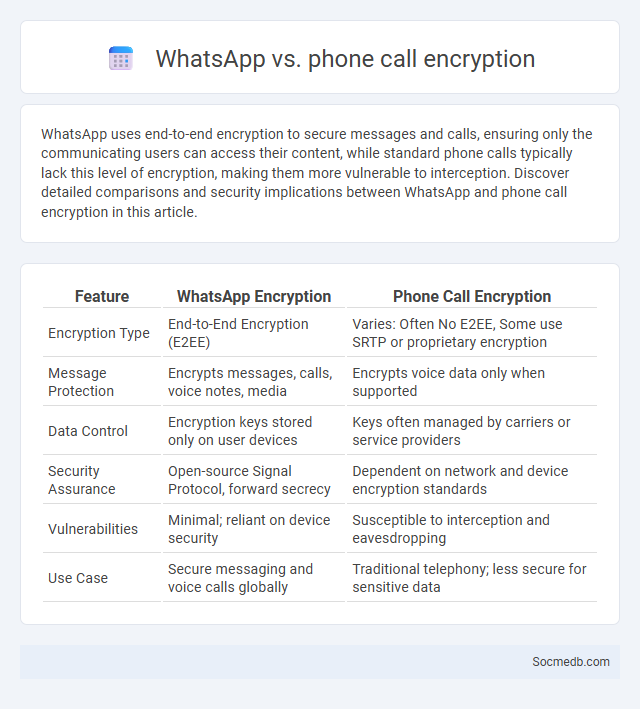
Photo illustration: WhatsApp vs phone call encryption
WhatsApp uses end-to-end encryption to secure messages and calls, ensuring only the communicating users can access their content, while standard phone calls typically lack this level of encryption, making them more vulnerable to interception. Discover detailed comparisons and security implications between WhatsApp and phone call encryption in this article.
Table of Comparison
| Feature | WhatsApp Encryption | Phone Call Encryption |
|---|---|---|
| Encryption Type | End-to-End Encryption (E2EE) | Varies: Often No E2EE, Some use SRTP or proprietary encryption |
| Message Protection | Encrypts messages, calls, voice notes, media | Encrypts voice data only when supported |
| Data Control | Encryption keys stored only on user devices | Keys often managed by carriers or service providers |
| Security Assurance | Open-source Signal Protocol, forward secrecy | Dependent on network and device encryption standards |
| Vulnerabilities | Minimal; reliant on device security | Susceptible to interception and eavesdropping |
| Use Case | Secure messaging and voice calls globally | Traditional telephony; less secure for sensitive data |
Understanding Encryption: A Brief Overview
Encryption secures social media communications by encoding messages, ensuring only authorized users can access the content and safeguarding user privacy against hackers and unauthorized surveillance. Algorithms like AES and RSA are commonly implemented to protect data during transmission and storage, enhancing overall platform security. Understanding encryption empowers users to recognize the importance of digital confidentiality in maintaining trust and safety across social networks.
What Is End-to-End Encryption?
End-to-end encryption (E2EE) ensures that only you and the intended recipient can read the messages by converting data into a coded format during transmission. This technology protects your social media communications from hackers, service providers, and unauthorized third parties by preventing any intermediaries from accessing the content. Platforms like WhatsApp and Signal utilize E2EE to guarantee the highest level of privacy and security for your personal conversations.
How WhatsApp Implements End-to-End Encryption
WhatsApp implements end-to-end encryption by using the Signal Protocol, which ensures that messages, calls, photos, and videos are secured from the sender to the recipient without third-party access. Your data is encrypted with unique cryptographic keys stored only on your device and the recipient's device, making interception or decryption impossible for hackers or even WhatsApp itself. This robust security framework guarantees that your personal conversations remain private and protected at all times during social media communication.
Traditional Phone Call Encryption Explained
Traditional phone call encryption uses advanced algorithms like AES and DES to secure voice communications by converting calls into ciphertext, preventing unauthorized access and eavesdropping. This encryption occurs at the network level, ensuring that even if calls are intercepted, the data remains indecipherable to hackers or third parties. Understanding these protocols empowers you to recognize how your voice data maintains privacy amid social media's evolving communication landscape.
Comparing WhatsApp Encryption vs Phone Call Encryption
WhatsApp uses end-to-end encryption based on the Signal Protocol, ensuring that only you and the recipient can read messages or listen to calls, with keys stored solely on user devices. Phone call encryption, often reliant on carrier protocols like GSM or LTE encryption, generally protects voice data in transit but may not guarantee end-to-end security, leaving potential vulnerabilities at network endpoints. Choosing WhatsApp offers stronger cryptographic protections specifically designed to safeguard both voice and text communications against interception.
Security Strength: WhatsApp vs Phone Call
WhatsApp offers end-to-end encryption, ensuring messages and calls remain private and inaccessible to third parties, whereas traditional phone calls typically lack this advanced security layer and can be intercepted more easily. Your data on WhatsApp is safeguarded through secure protocols that protect against eavesdropping and unauthorized access. Choosing WhatsApp for communication significantly enhances your security strength compared to standard phone calls.
Privacy Implications for Users
Social media platforms collect extensive personal data, raising significant privacy concerns for users worldwide. The increasing use of targeted advertising algorithms and data sharing with third-party companies often results in unauthorized access and misuse of sensitive information. Users must be aware of privacy settings and adopt cautious sharing practices to protect their digital identities from potential breaches and exploitation.
Vulnerabilities and Potential Risks
Social media platforms expose Your personal data to vulnerabilities like phishing attacks, identity theft, and privacy breaches, which can result in financial loss or reputational damage. Weak password management and outdated security settings increase the risk of unauthorized account access and data leaks. Understanding these potential risks empowers You to implement stronger security practices and protect Your digital presence effectively.
Government Access and Legal Concerns
Government access to social media data raises significant legal concerns surrounding privacy rights, data protection laws, and surveillance regulations. Law enforcement agencies often request user information through subpoenas or warrants, sparking debates about transparency and accountability. Legal frameworks such as the GDPR and the Stored Communications Act aim to balance national security interests with individual civil liberties on digital platforms.
Choosing the Right Communication Method for Security
Selecting the appropriate social media communication method is crucial for maintaining security and protecting sensitive information. Encrypted messaging platforms like Signal or WhatsApp offer end-to-end encryption, ensuring that messages remain private and inaccessible to unauthorized parties. Prioritizing secure communication tools reduces the risk of data breaches and safeguards user confidentiality across social networks.
 socmedb.com
socmedb.com